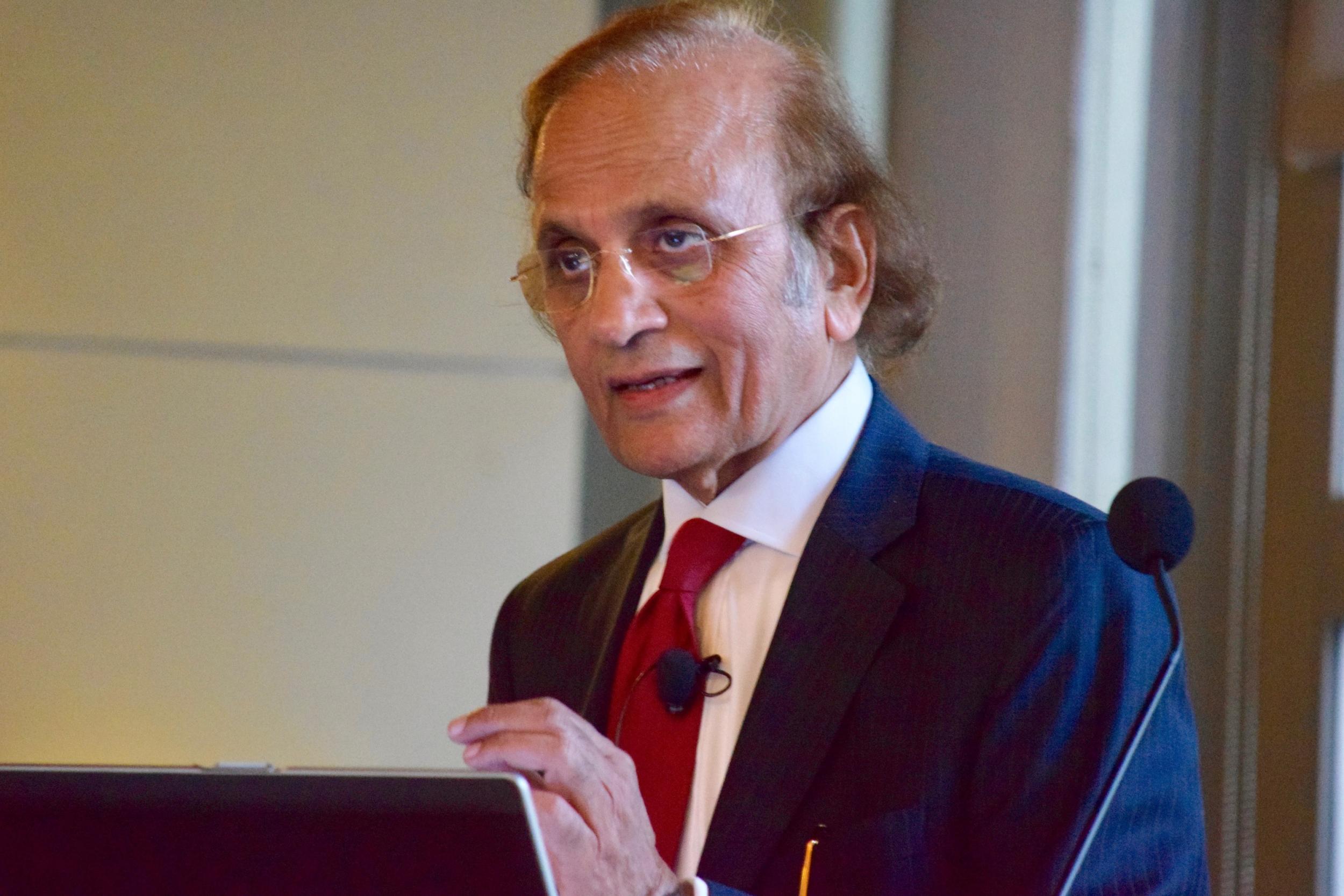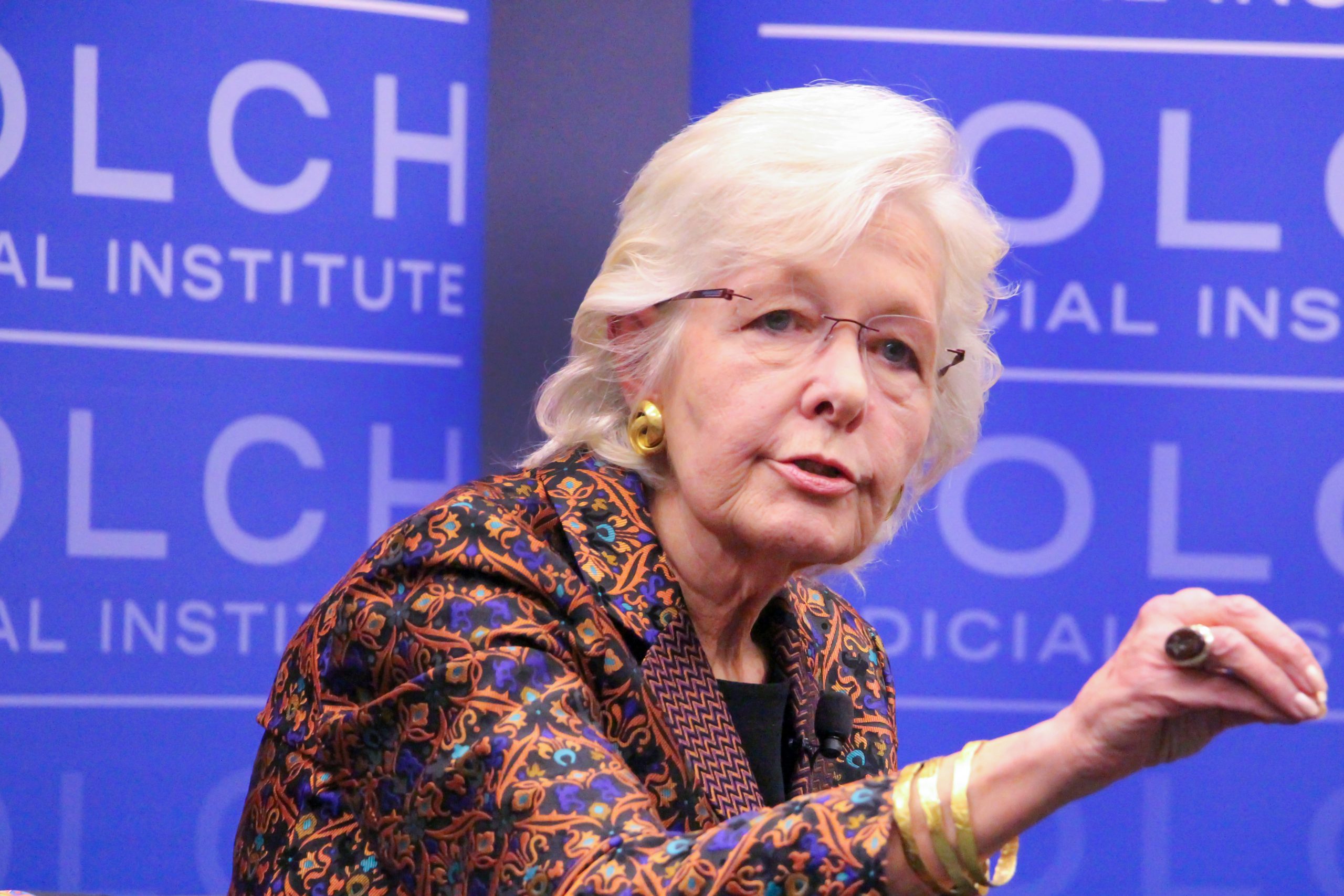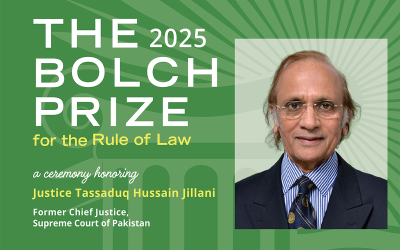The Susan and Carl Bolch Jr. Prize for the Rule of Law is awarded annually to an individual or organization who has demonstrated extraordinary dedication to the rule of law and advancing rule of law principles around the world.
By honoring those who do this work, the Bolch Prize draws attention to the ideals of justice and judicial independence and to the constitutional structures and safeguards that undergird a free society.
The Prize is awarded in accordance with the Bolch Judicial Institute’s founding documents, which specify it “shall be given by the Bolch Judicial Institute to recognize the lifetime achievement of an individual or a single or series of acts of an individual or an organization creating, promoting, or preserving the importance of the rule of law nationally or internationally.”
The recipient is selected by the Bolch Judicial Institute’s Advisory Board and honored during a ceremony at Duke University. The Prize includes a custom artwork and a significant monetary award. The first prize was awarded on April 11, 2019, to Supreme Court Justice Anthony M. Kennedy (retired) at a ceremony held on Duke University’s campus.
Prize Recipients
Chief Justice Tassaduq Hussain Jillani, 2025
The 21st Chief Justice of Pakistan
Tassaduq Hussain Jillani, the 21st Chief Justice of Pakistan, has been named the recipient of the 2025 Bolch Prize for the Rule of Law by the Bolch Judicial Institute of Duke Law School. The prize recognizes Chief Justice Jillani’s extraordinary contributions to advancing gender equality, religious liberty, and judicial independence in South Asia and globally. He will be honored during a ceremony at Duke University in April.
Additional Links:
Justice Sandra Day O’Connor, 2024
Associate Justice of the United States Supreme Court (Sept. 25, 1981 – Jan. 31, 2006)
The Bolch Judicial Institute has awarded the late U.S. Supreme Court Justice Sandra Day O’Connor as the 2024 recipient of the Bolch Prize for the Rule of Law in recognition of her pathbreaking career, which included service as a lawyer, state legislator, state court judge, and the first woman justice of the United States Supreme Court.
Justice O’Connor was honored posthumously at a ceremony at Duke University on April 4, 2024.
Additional Links:
- WATCH: Bolch Prize for the Rule of Law: A Ceremony Honoring Justice Sandra Day O’Connor (Video)
-
WATCH: A Panel Discussion with Justice Sandra Day O’Connor’s Former Law Clerks (Video)
-
Photo Gallery: Bolch Prize 2024 (Photos)
- The late Justice Sandra Day O’Connor named 2024 Bolch Prize recipient for foundational work in civics education (Article)
International Association of Women Judges (IAWJ), 2023
The Bolch Judicial Institute has named the International Association of Women Judges (IAWJ) as the 2023 recipient of the Bolch Prize for the Rule of Law in recognition of the organization’s remarkable efforts to evacuate, support, and resettle Afghan women judges who, because of their gender and work as judges, have faced persecution and violence since the Taliban took control of the country in late 2021.
The IAWJ was honored during a ceremony at Duke University on March 1, 2023.
Additional Links:
Judge J. Clifford Wallace, 2022
Chief Judge Emeritus of the U.S. Court of Appeals for the Ninth Circuit
Chief Judge Emeritus J. Clifford Wallace of the U.S. Court of Appeals for the Ninth Circuit was the 2022 Bolch Prize for the Rule of Law. He was honored at a ceremony in San Diego, Calif., on March 18, 2022.
Through more than 50 years of service to the federal courts, Judge Wallace has led multiple efforts to improve the administration of justice in his circuit and in the federal courts, served his community and church through a wide variety of leadership roles, and advised judiciaries around the world on the development of the rule of law and the administration of justice. Judge Wallace has traveled to more than 70 countries, often at his own expense, to work with judges and governments to strengthen judicial processes, improve court structures, and develop innovative solutions to logistical and legal challenges.
Additional Links:
- Bolch Prize ceremony honoring Judge J. Clifford Wallace to be held in San Diego March 18 (Article)
- Judge J. Clifford Wallace to receive 2022 Bolch Prize (Article)
- Bolch Prize awarded to a “collaborator, a helper” (Article)
- Bolch Prize for the Rule of Law: A Ceremony Honoring Judge J. Clifford Wallace (Video)
- A Conversation with Judge J. Clifford Wallace (Podcast)
- Photo Gallery: Bolch Prize 2022 (Photos)
Chief Justice Margaret H. Marshall, 2021
Chief Justice of the Massachusetts Supreme Judicial Court (retired)
“I can never forget the awed admiration I felt when, for a sharply divided court, she handed down her eloquent judicial affirmation, the first, ever, of the right to equal marriage for LGBTIQ people.”
— Justice Edwin Cameron, retired Justice of the Constitutional Court of South Africa
Chief Justice Margaret H. Marshall (ret.) of the Massachusetts Supreme Judicial Court received the 2021 Bolch Prize for the Rule of Law. From her anti-apartheid advocacy as a young adult in her native South Africa to her pathbreaking leadership as the first woman to serve as Massachusetts’ chief justice, to her steadfast commitment to ensuring equal justice for all before the law, Chief Justice Marshall has been a lifelong advocate for a more transparent, efficient, and accountable judiciary.
Before retiring as chief justice in 2010, Chief Justice Marshall wrote hundreds of opinions, including the groundbreaking 2003 decision in Goodridge v. Department of Public Health, which held that the Massachusetts Constitution prohibits the state from denying same-sex couples access to civil marriage. The opinion made Massachusetts the first state to legalize gay marriage and laid the groundwork for a sea change in attitudes and law across the United States.
Additional Links:
- Retired Mass. Supreme Judicial Court Chief Justice Margaret H. Marshall to receive 2021 Bolch Prize (Article)
- Judgment Calls: Conversation with Chief Justice Margaret H. Marshall (Podcast)
- Watch the Bolch Prize celebration honoring Justices Moseneke, Marshall (Video)
- Bolch Judicial Institute welcomes retired Mass. Chief Justice Margaret Marshall (Article)
- Watch these 10 movies & shows featuring real judges (Article)
Justice Dikgang Moseneke, 2020
Deputy Chief Justice of the Constitutional Court of South Africa (retired)
“Justice Moseneke is a globally respected judge and thinker who, with great devotion to the rule of law and a deep understanding of the principles that animate a democratic society, helped bring a broken nation into a new century of promise, equality, and justice.”
— David F. Levi, director of the Bolch Judicial Institute
Justice Dikgang Moseneke was the 2020 recipient of the Bolch Prize for the Rule of Law. During 15 years as an internationally revered justice and then as deputy chief justice of the South Africa Constitutional Court, Justice Moseneke wrote numerous influential opinions that helped clarify and strengthen democratic principles among the branches of government in South Africa as it emerged from apartheid.
A lifelong advocate for human rights, Justice Moseneke has written and spoken extensively on the rule of law and its importance, offering a perspective shaped by his experiences as a political prisoner during apartheid. Justice Moseneke’s legacy as a leader in the law includes jurisprudence on affirmative action, rule of law, separation of powers, socio-economic rights, property, economic justice, and anti-corruption law.
Additional Links:
- Justice Dikgang Moseneke Receives 2020 Bolch Prize for the Rule of Law (Article)
- A Freedom Fighter and Judicial Luminary: 2020 Bolch Prize Honors Dikgang Moseneke of the South Africa Constitutional Court (Article)
- Judgment Calls: A Conversation with Hon. Dikgang Moseneke (Video)
- Watch the Bolch Prize celebration honoring Justices Moseneke, Marshall (Video)
- Watch these 10 movies & shows featuring real judges (Article)
Justice Anthony M. Kennedy, 2019
Associate Justice of the United States Supreme Court (retired)
“If there’s anything that Justice Kennedy’s jurisprudence has been dedicated to it is to the dignity of every single person. He exemplifies what the rule of law means. His work will go down in history of the Supreme Court. He is surely one of the most important Supreme Court justices of the modern era and his work will be studied by scholars for many years to come.”
— Justice Samuel Alito, Associate Justice of the United States Supreme Court
Retired United States Supreme Court Justice Anthony M. Kennedy received the inaugural Bolch Prize for the Rule of Law on April 11, 2019, during a ceremony with Duke Law alumni and leaders from the North Carolina judiciary and legal community.
Justice Kennedy was recognized for more than four decades of service on the federal bench, including 30 years on the Supreme Court, as well as his teaching and speaking in support of rule of law principles and civic education in the United States and abroad.
Through public appearances and teaching engagements, Justice Kennedy has worked to build public understanding of and appreciation for the role of an independent judiciary in a functioning democracy. He has lectured at law schools and universities in many countries, speaking about the rule of law and the connections between economic and social progress and a system of laws that protect freedom and prevent corruption. Justice Kennedy is widely recognized for his devotion to the Constitution and his efforts to share the ideals of liberty and democracy with students and audiences around the world.
Additional Links:
Bolch Prize In The News
Justice Tassaduq Hussain Jillani Honored with 2025 Bolch Prize for the Rule of Law
Pictured Above: Paul W. Grimm (left) presents the Bolch Prize to Justice Tassaduq Hussain Jillani. Photo Credit: Les Todd Click here to watch the recording of the full ceremony on YouTube. The Bolch Judicial Institute honored former Chief Justice of Pakistan Tassaduq...
Bolch Prize 2025 Ceremony To Be Held at Nasher Museum of Art on April 16
The 2025 Bolch Prize ceremony will honor former Chief Justice of Pakistan Tassaduq Hussain Jillani for his dedication to furthering the rule of law in Pakistan. Click here for more information about the speakers at the ceremony. t an evening...
Former Chief Justice of Pakistan Tassaduq Hussain Jillani to receive 2025 Bolch Prize
As a trailblazing jurist, Chief Justice Jillani authored landmark opinions to help advance human rights, gender equity, and democracy in Pakistan. FOR IMMEDIATE RELEASE — Tassaduq Hussain Jillani, the 21st Chief Justice of Pakistan, has been named the recipient of the...










